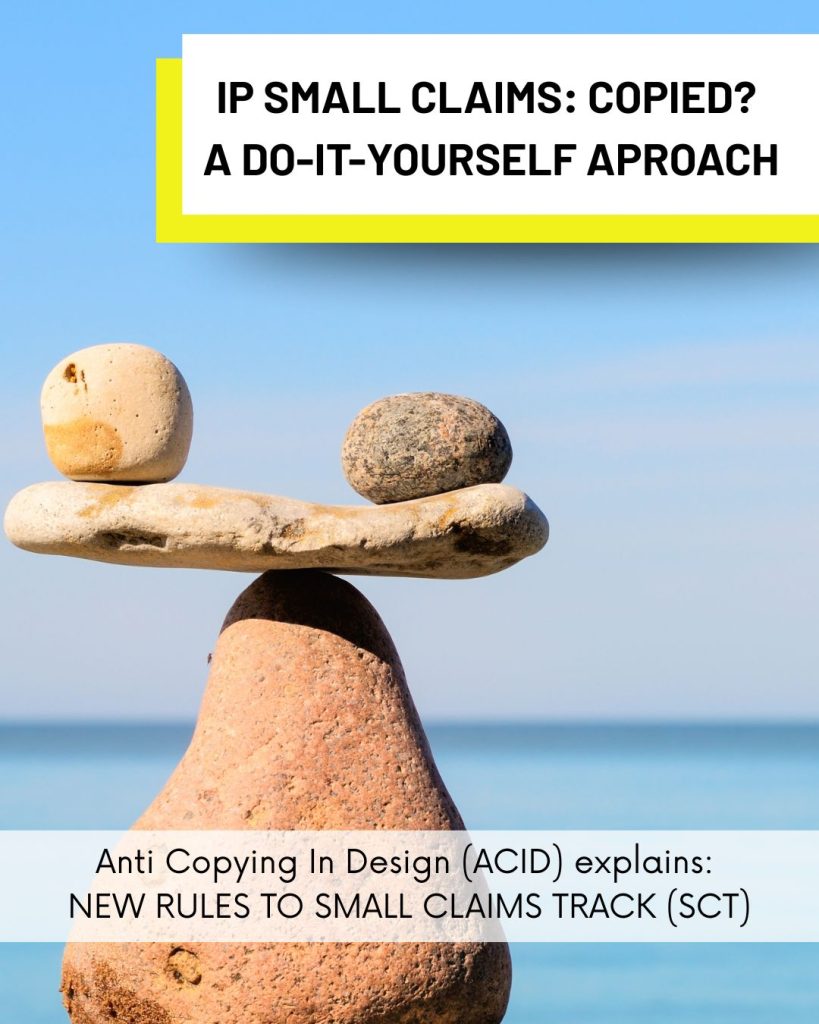

The government has simplified the guidance to the Intellectual Property Enterprise Court (IPEC) Small Claims Track (SCT). The Intellectual Property Office (IPO) has been working with IPEC to simplify guidance for individuals & SMEs who use the SCT to resolve low-value disputes. See IPO guidance here and here
Practical tips include:
What is the SCT?
The SCT handles straightforward IP claims under £10,000, with simpler procedures, minimal costs risk, little pre-hearing work and no need for legal representation or formal trials. These cases are heard by full-time or deputy district judges; multi-track cases are heard by enterprise or deputy IPEC judges.
What is covered?
Copyright, UK registered trade marks including comparable UK trade marks, passing off, UK unregistered design rights (UDRs) and supplementary unregistered design rights (SUDs).
Remarkably, with the government’s push to register designs, they are not included, which seems an anomaly. (ACID)
Where will cases be heard?
Small Claims, also known as small claims track cases, are typically heard in a County Court. Often, they are held in the judge’s room or a courtroom. The process is less formal than other civil court cases.
What are the benefits?
Informal & efficient: Hearings are typically short, less formal, and parties often represent themselves.
Low procedure risk and limited costs exposure: Unlike multi-track, the SCT has very restricted cost orders, meaning losers rarely pay winners’ costs.
Expert adjudication: Experienced district or enterprise judges hear cases.
Available regionally: While London (Rolls Building) is the primary venue, SCT cases can be heard in courts across England and Wales (Birmingham, Bristol, Cardiff, Leeds, Liverpool, Manchester and Newcastle).
The SCT now supports electronic filing (CE-File) for smoother submission of claims across regional IPEC Courts and Tribunals JudiciaryGOV.UK.
Submitting a claim through the SCT – Eleven Steps.
1. Claim advice – When issuing your claim, state your preference for the SCT in the particulars of claim. GOV.UK JusticeGOV.UK
2. Pre-Action Steps – Consider mediation or ADR before starting—under Civil Procedure Rules, these are encouraged and may affect costs. ACID offer a Mediation Programme, read more here.
3. Issuing the Claim – complete a Claim Form and submit it to the IPEC (e.g., at Rolls Building, London, or a regional Business & Property Court).GOV.UK+1 pay court fees, which vary based on claim value (e.g., £455 for up to £10,000).
4. Serving the Claim – Send the Claim Form and Particulars of Claim to the defendant within 14 days and file a certificate of service.
5. Defendant Response – The Defendant has 14 days to respond or can extend by 5–8 weeks via acknowledgment of service. If the defendant doesn’t respond, you may obtain judgment in default.
6. Case Allocation – The court will finalise SCT allocation unless contested or criteria aren’t met.
7. Case Management – A judge may hold a case management conference to set deadlines and processes. The court may also decide based on documents alone if parties agree.
8. Mediation Option – Free mediation is available before the hearing, often by phone, and may reduce hearing costs.
West Sussex Portrait PhotographerGOV.UK a case study.
9. Hearing – Hearings are short and informal, often attended by judge, parties (with or without lawyers), witnesses, and clerk. West Sussex Portrait PhotographerGOV.UKCourts and Tribunals Judiciary
10. Judgment & Enforcement – The judge delivers a decision. If the defendant doesn’t comply, you may enforce the judgment (e.g., using bailiffs).
11. Appeal – You may appeal with permission, using application to the same court, Court of Appeal, or Chancery Division depending on the issue.
ACID Co-founder and Chair, Dids Macdonald OBE., said, “We welcome these changes as it is only fair that lone, micro and SME creators have an accessible legal process that is fit for purpose to enable cost and time effective redress in low value claims. In the Calls for Views, Questionnaire, and latest IPO survey, prior to a much-awaited Design Consultation, representation was made by ACID that it is imperative that designers, the lifeblood of the creative industries, are properly supported against Goliath predators,
We invite all users to give us further feedback so that we can assess if these improvements are making a real difference.”
Watch our recent IPEC webinar with Tony Catterall from ACID Legal Affiliates Taylors Solicitors here.
Read about ACID Member Imogen’s Imagination’s experience with the IPEC here.
Spread the Word
| Cookie | Duration | Description |
|---|---|---|
| cookielawinfo-checkbox-analytics | 11 months | This cookie is set by GDPR Cookie Consent plugin. The cookie is used to store the user consent for the cookies in the category "Analytics". |
| cookielawinfo-checkbox-functional | 11 months | The cookie is set by GDPR cookie consent to record the user consent for the cookies in the category "Functional". |
| cookielawinfo-checkbox-necessary | 11 months | This cookie is set by GDPR Cookie Consent plugin. The cookies is used to store the user consent for the cookies in the category "Necessary". |
| cookielawinfo-checkbox-others | 11 months | This cookie is set by GDPR Cookie Consent plugin. The cookie is used to store the user consent for the cookies in the category "Other. |
| cookielawinfo-checkbox-performance | 11 months | This cookie is set by GDPR Cookie Consent plugin. The cookie is used to store the user consent for the cookies in the category "Performance". |
| viewed_cookie_policy | 11 months | The cookie is set by the GDPR Cookie Consent plugin and is used to store whether or not user has consented to the use of cookies. It does not store any personal data. |